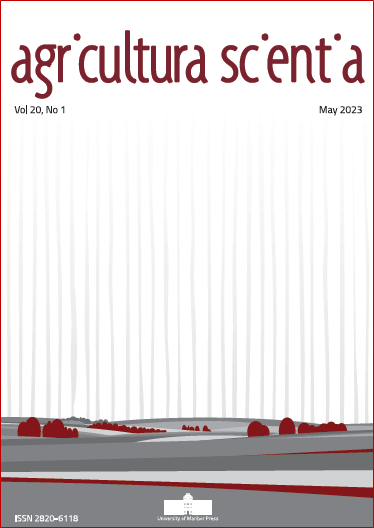The Effect of Biochar Applied Alone and in Combination with Mineral and Organic Fertilisers on the Yield of White Cabbage and Soil Properties
DOI:
https://doi.org/10.18690/agricsci.20.1.2Keywords:
biochar, soil amendments, fertilisers, soil chemical properties, cabbage yieldAbstract
The study aimed to investigate the effectiveness of biochar application on fertile soils in a temperate climate during the first year of application. The field trial was conducted on a nutrient-rich silt loam soil at two experimental sites in north-eastern Slovenia (Biš and Skorba). The effect of biochar applied alone or in combination with compost or mineral fertiliser on soil properties and yield of white cabbage was studied. In addition to the control (C), the soil received five treatments including biochar (B; 1.5 t/ha), compost (CO; 1.5 t/ha), biochar-mixed compost (BCO; 3.0 t/ha), standard mineral fertilisers (NPK; NPK 0.35 t/ha, potassium sulphate 0.25 t/ha and calcium ammonium nitrate 0.25 t/ha) and combined application of half the amount
of NPK and BCO (NPK+BCO). The results showed that the applied treatments had no significant influence on the measured soil chemical parameters, except for the amount of total organic carbon, electrical conductivity and pH in Biš and total carbon in Skorba. All investigated parameters (cabbage head weight, head circumference, total and market yield) were higher at the experimental site Skorba. Statistically significant differences were found only at the experimental site Biš, where the treatment influenced all parameters (p < 0.01), except for the head circumference of the cabbage. The NPK and NPK+BCO treatments produced significantly higher total yields (66.7 t/ha and 65.8 t/ha, respectively) and marketable yields (53.2 t/ha and 51.8 t/ha, respectively) compared to the other treatments (41.3-52.6 t/ha and 30.5-42.4 t/ha, respectively). Although the differences between the other treatments were insignificant, a trend of decreasing cabbage yields towards CO > BCO > B was observed. Similar results were also obtained when analysing the average data of the two experimental sites.
Downloads
References
Downloads
Published
Issue
Section
License
Copyright (c) 2023 Manfred Jakop, Nataša Belšak, Erik Rihter, Tjaša Cenčič Predikaka, Denis Stajnko, Silva Grobelnik Mlakar

This work is licensed under a Creative Commons Attribution-NonCommercial-NoDerivatives 4.0 International License.
